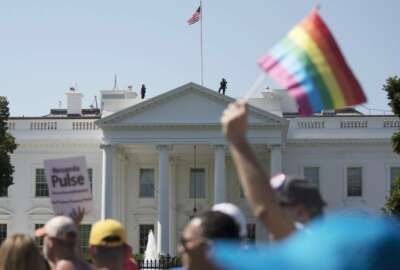Subscribe to Federal Drive’s daily audio interviews on iTunes or PodcastOne.
Despite efforts from the Trump administration over the last six months, transgender people will be able to openly join the military starting Jan. 1.
The D.C. District Court struck down a request by the Defense Department to delay the accession of transgender people.
The move is a blow to President Donald Trump’s plans to ban transgender people from the military, which he announced on July 26.
DoD announced it will comply with the court ruling as it continues to appeal the decision.
The court already granted an injunction to the plaintiffs of the case, effectively stopping any new policy and forcing DoD to continue with the Obama era policy of allowing transgender troops to serve openly and receive medical care.
DoD asked the court last week to delay the accession of transgender troops because it would impose “extraordinary burdens on the department and the military services,” stated a document written by DoD’s Principal Director of Military Personnel Policy Lernes Hebert, requesting a stay on the order from the court. “For organizations as large and as complex as the Defense Department and the military services, the study, development and implementation of significant personnel policies is necessarily a substantial undertaking.’
The court didn’t buy any of DoD’s arguments.
“The court is not convinced by Mr. Hebert’s declaration that defendants will be irreparably harmed in the absence of a stay. Although Mr. Hebert’s declaration contains a lengthy discussion of the administrative difficulties associated with implementing a new accession policy in general, it fails to acknowledge the considerable amount of time defendants have already had to prepare for the implementation of this particular policy,” the ruling from U.S. District Judge Colleen Kollar-Kotelly stated.
“The directive from the secretary of defense requiring the military to prepare to begin allowing accession of transgender individuals was issued on June 30, 2016 — nearly 1 ½ years ago. For more than a year preceding the summer of 2017, it was the policy and intention of the military that transgender individuals would soon begin to accede.”
Both the RAND Corporation and the New England Journal of Medicine conducted previous studies on the effects of transgender people in the military and found any disruption to be minimal.
DoD announced it was doing another internal study after Trump announced the ban, but critics saw it as a stalling tactic.
“It’s never bad to have more information, but that having been said, the topic has already been studied to death and every study has come up with the same conclusion, which is that inclusive policy for LGBT troops promotes readiness. If Secretary [James] Mattis undertakes a fair and comprehensive process, he will reach the same conclusion as every other researcher,” said Aaron Belkin, executive director of the Palm Center, a research group that focuses on LGBTQ issues.
The transgender military ban has been criticized by prominent figures in the military and DoD.
Chairman of the Joint Chiefs of Staff Gen. Joseph Dunford, Coast Guard Commandant Adm. Paul Zukunft, Navy Secretary Richard Spencer and other officials have all expressed support for keeping transgender people in the military.
“I believe any individual who meets the physical and mental standards, and is worldwide-deployable and is currently serving, should be afforded the opportunity to continue to serve,” Dunford told Congress on Sept. 26.
Zukunft said he reached out to the 13 transgender members of the Coast Guard after Trump’s tweets and assured them he would not turn his back on them.
“We have made an investment in you and you have made an investment in the Coast Guard, and I will not break faith,” Zukunft said in August.
Spencer told reporters in August that he believed any patriot should be able to serve in the military.
Trump claimed his decision to ban transgender people from the military was based on “consultation with my Generals and military experts,” yet there has been little evidence to support the claim.
In October, Rep. A. Donald McEachin (D-Va.), along with more than 110 other lawmakers, requested the information Trump used to inform his ban.
The lawmakers requested information about “what discussions or correspondence between the Pentagon, if any, led President Trump to make his assertion.” The letter to the administration asks for any letters, emails, telephone transcripts, meeting logs or other material.
“We seek access to these materials in order to determine whether the president, his national security team and military leaders are actively coordinating policy with one another, or whether the president’s transgender ban announcement reflected a breakdown in communication,” the letter stated.
Copyright
© 2024 Federal News Network. All rights reserved. This website is not intended for users located within the European Economic Area.
